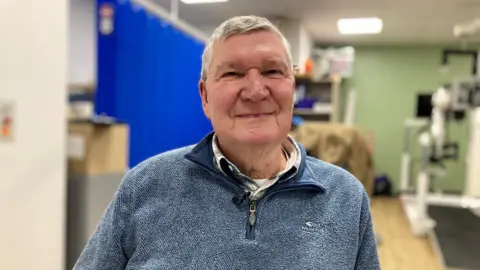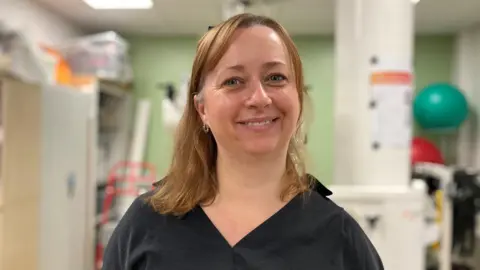Wearable devices trial aims to improve stroke rehab
 BBC
BBCPeople living in Dorset who have had a stroke within the last 10 years are being invited to take part in a "potentially ground-breaking" clinical trial.
The trial is looking at how a specialised device can help strengthen hand and arm function, using a small earpiece to stimulate the vagus nerve.
Called transcutaneous vagus nerve stimulation (TVNS), it forms part of rehabilitation therapy, and involves sending mild electrical pulses to the brain.
Patients will be asked to wear it while they move their weak arm.
The stimulation is automatically activated as the arm is moved during therapy and the connected earpiece gently tickles the ear.
This can be done at home and does not involve invasive surgery.
A stroke occurs when blood stops flowing to a part of your brain, it can affect things like speech and movement – and can take a long time to recover.

Led by researchers in Sheffield, the £2m trial is being run in 19 centres around the country, including from locations in Bournemouth, Sherborne and Dorchester.
Patients have already been enrolled via two local NHS trusts - UHD and Dorset HealthCare - but researchers need more people to come forward.
Ian Odd, 76, who lives in Dorset, had a stroke in 2020 and is taking part in the trial.
He said he was "very tired" after his stroke.
"Even doing simple hand exercises was very, very difficult," he said.
"There's so many frustrating things that you need two hands for - simple little things, like doing a zip up."
He said he jumped at the opportunity to be involved in the trial.
"Anything that can help me, four years down the line, I will be more than happy to try it, because I wasn't improving with the exercises I was doing," he said.
"This trial gives people some hope that you can get back some, if not all, the functions that you had before."
Known as the TRICEPS trial, it will run for two years.
Dr Louise Johnson, consultant therapist in stroke rehabilitation at University Hospitals Dorset, said: "This is potentially quite a ground-breaking trial for upper limb recovery after stroke.
"So, if the trial demonstrates that vagal nerve stimulation enhances the benefits of rehabilitation, then we can look at rolling out this intervention on the NHS to help people's recovery."
You can follow BBC Dorset on Facebook, X, or Instagram.
